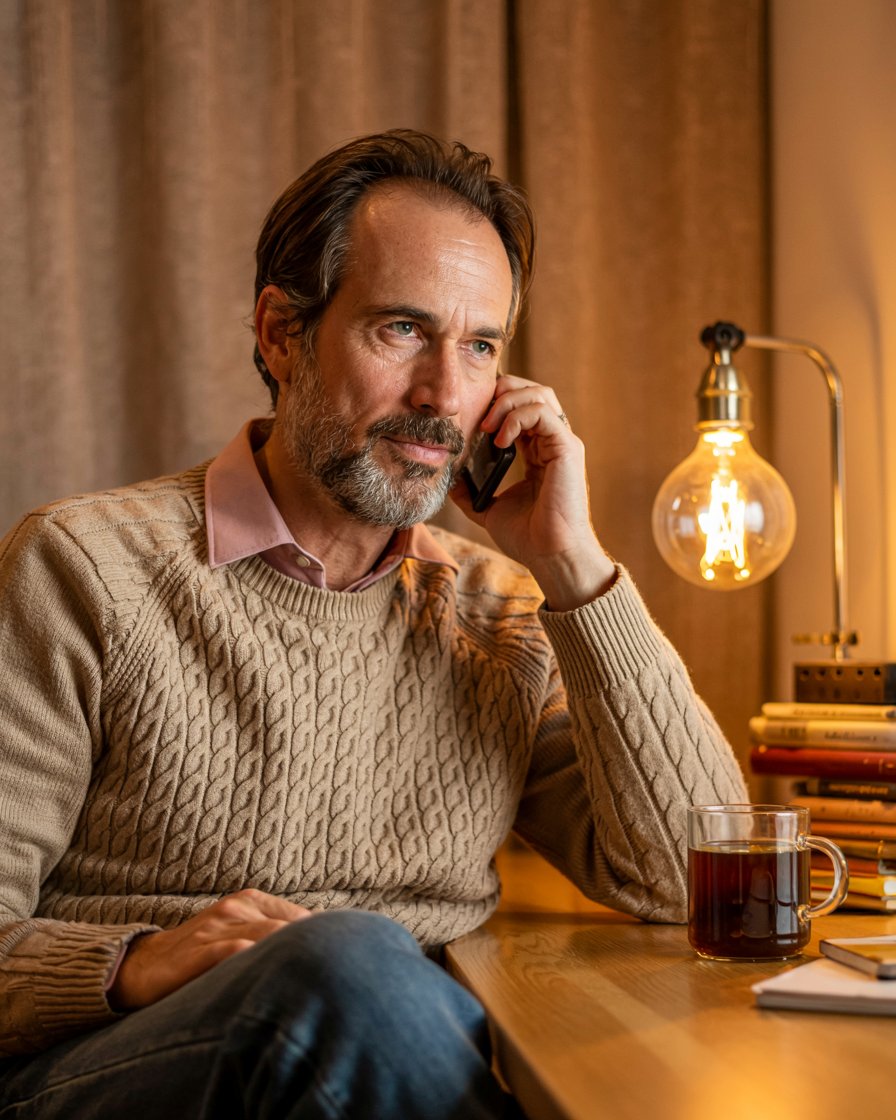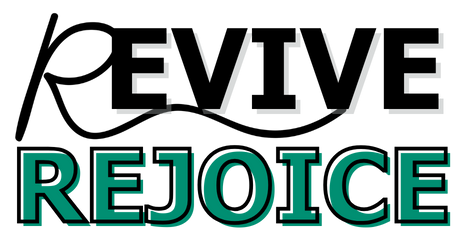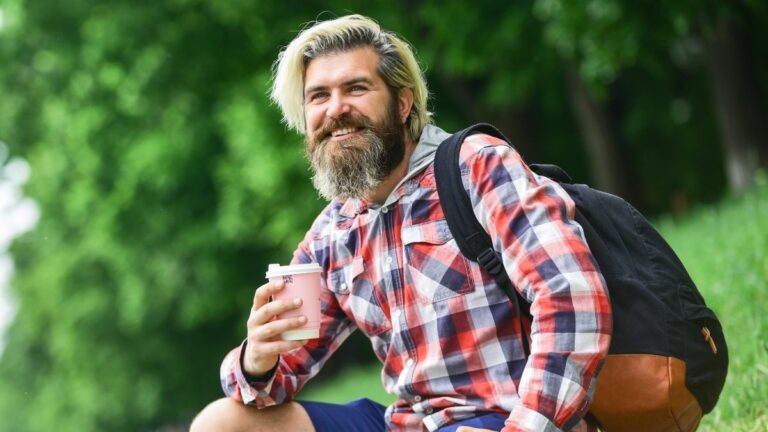15 Life-Changing Wellness Habits Helping 60+ Seniors Outperform Their Grandchildren (According to Recent Study)
While 30% of young adults report feeling lonely daily, centenarians in Blue Zones maintain rich social connections well into their 100s—and research reveals this is just one of 15 habits helping older adults excel in surprising ways.
Most aging advice focuses on decline, but recent studies show successful agers outperform younger generations in emotional regulation, decision-making, and life satisfaction.
The truth is, your 60s, 70s, and beyond can be your most fulfilling decades when you adopt the right approach. Here are 15 research-backed wellness habits from Blue Zones, successful aging studies, and longevity research that help seniors not just survive, but thrive with remarkable vitality and wisdom.
15 Research-Backed Habits That Help You Age Like the World’s Healthiest People
You wake up tired. Your joints ache. You forget where you put your keys again. Sound familiar?
Habit Title
Summary placeholder.
ACTION STEPS:
Getting older doesn’t have to mean getting sicker or less capable. In fact, some of the world’s healthiest people live in places called Blue Zones. These folks regularly hit 100 years old while staying sharp, strong, and happy.
What’s their secret? It’s not magic pills or expensive treatments. It’s simple daily habits anyone can learn.
Here are 15 research-backed habits that can help you age with strength, purpose, and joy.
The Foundation Habits: Building Your Base
These first five habits form the foundation of healthy aging. Master these, and everything else gets easier.
1. Stop Eating When You’re 80% Full
The people of Okinawa, Japan live longer than almost anyone else on Earth. They follow a simple rule called “hara hachi bu” – stop eating when you’re 80% full.

This isn’t about starving yourself. It’s about eating just enough.
Why it works: Your brain takes 20 minutes to realize you’re full. When you stop at 80%, you give your body time to catch up. This prevents overeating and helps you maintain a healthy weight as you age.
Research shows that eating less (but still getting good nutrition) can add years to your life. It reduces inflammation, lowers disease risk, and keeps your mind sharp.
How to do it:
- Eat slowly and pay attention to your food
- Put your fork down between bites
- Use smaller plates and bowls
- Stop when you feel satisfied, not stuffed
- Wait 20 minutes before deciding if you need more food
Start with one meal per day. Practice stopping at 80% full during lunch for a week. Then add breakfast and dinner.
2. Eat Like the Mediterranean (But Make It Mostly Plants)
People in Blue Zones eat about 95% plants. The Mediterranean diet, packed with vegetables, beans, and olive oil, cuts heart disease death risk by 30%.
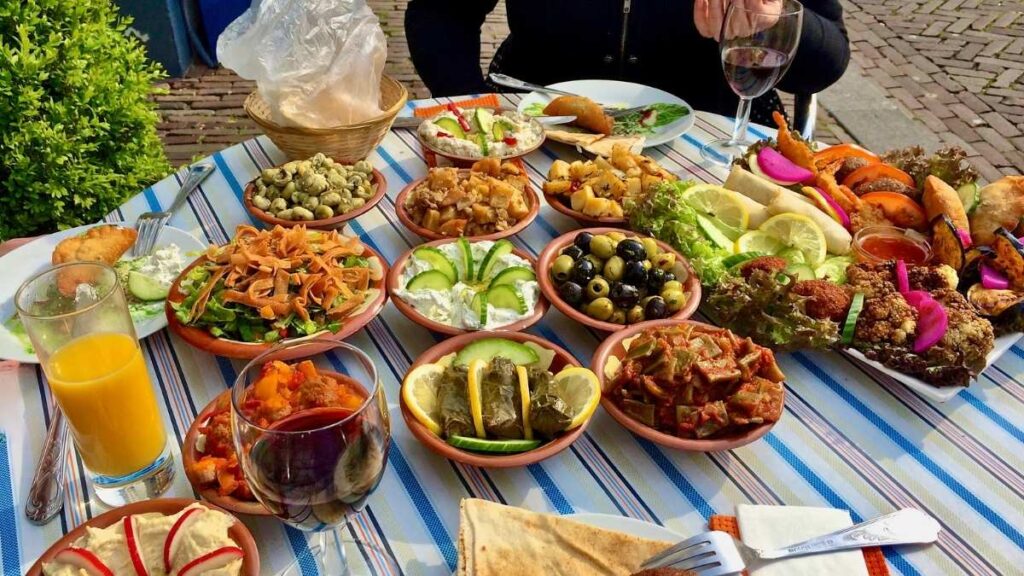
But here’s what matters most: beans.
Every long-living culture eats beans daily. Black beans in Costa Rica. Lentils in Sardinia. Chickpeas in Greece.
Why it works: Beans are protein powerhouses that stabilize blood sugar and feed healthy gut bacteria. Leafy greens slow brain aging. Nuts can add 2-3 years to your life.
Your daily targets:
- 1 cup of beans (add them to soups, salads, or eat as hummus)
- 2 handfuls of nuts (almonds, walnuts, or whatever you like)
- Dark leafy greens with every meal
- Olive oil for cooking and dressing
Quick win: Add a can of rinsed beans to your next salad or soup. That’s it. Do this daily and you’re already eating like the world’s longest-living people.
Don’t stress about being perfect. If 95% plants feels impossible, start with 51%. Even small changes add up over time.
3. Move Your Body Every Day (But Skip the Gym Obsession)
Forget the idea that you need intense gym sessions to stay healthy as you age. The world’s longest-living people don’t do CrossFit or run marathons.

They walk. They garden. They take stairs. They move naturally all day long.
The research is clear: You need 150 minutes of moderate activity each week. That’s just over 20 minutes per day. But here’s the key – it doesn’t have to happen all at once.
What matters most as you age:
- Walking: Your best friend for heart health and brain function
- Balance practice: Prevents falls (the leading cause of injury in older adults)
- Strength work: Keeps your muscles from disappearing
- Daily movement: Better than weekend warrior workouts
Your movement plan:
- Walk 30 minutes most days (or three 10-minute walks)
- Practice standing on one foot while brushing teeth
- Do bodyweight exercises twice per week (push-ups, squats, planks)
- Take stairs when possible
- Garden, clean house, or do active hobbies
The goal isn’t to become an athlete. It’s to keep moving so you can keep living fully.
4. Sleep Like Your Life Depends on It (Because It Does)
Poor sleep kills. Literally. People who sleep less than 6 hours or more than 9 hours per night die earlier than those who get 7-8 hours.

As you age, sleep changes. You might wake up more often or feel tired during the day. This isn’t just annoying – it’s dangerous for your brain and body.
Why sleep matters more as you age:
- Clears toxins from your brain
- Strengthens your immune system
- Helps your body repair itself
- Keeps your mood stable
Your sleep optimization plan:
- Same bedtime and wake time every day (yes, even weekends)
- Dark, cool bedroom (around 65-68°F)
- No screens 1 hour before bed
- Short naps (under 30 minutes) if needed
- Morning sunlight to set your internal clock
If you’re struggling: Don’t just accept “bad sleep comes with age.” Talk to your doctor. Sleep apnea, restless legs, and other issues can be treated.
Good sleep isn’t a luxury. It’s medicine for your brain and body.
5. Master Stress Instead of Letting It Master You
Here’s something amazing: older adults are actually better at handling stress than younger people. Your brain gets better at emotional control as you age.
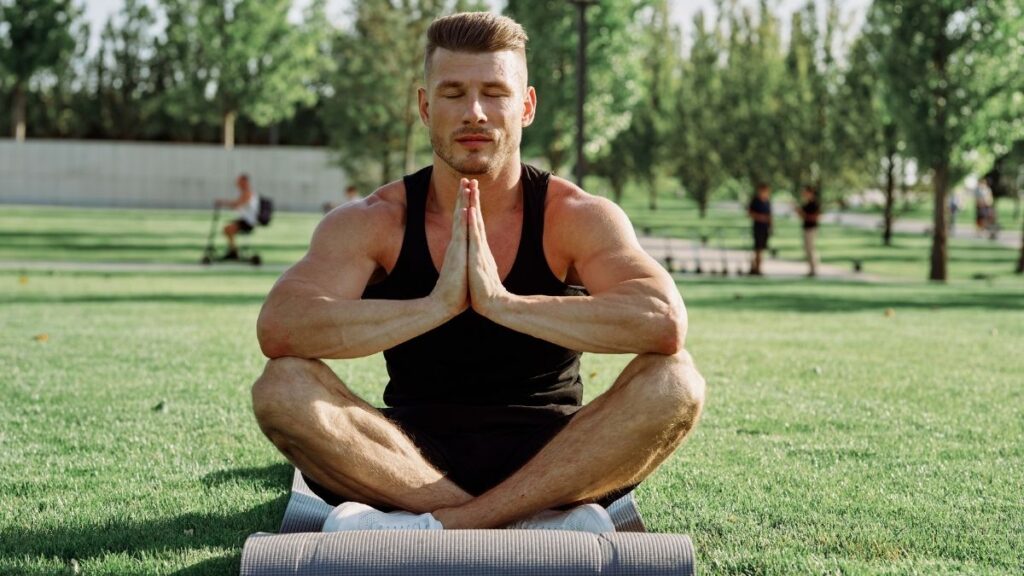
But you still need to work at it.
Chronic stress ages your body faster than almost anything else. It shrinks your brain, weakens your immune system, and increases disease risk.
The good news: You have tools that younger people haven’t developed yet. Experience teaches you what matters and what doesn’t.
Your stress-mastery toolkit:
- Daily meditation: Even 10 minutes helps (try apps like Headspace or Calm)
- Deep breathing: 4 counts in, hold for 4, out for 6
- Perspective practice: Ask “Will this matter in 5 years?”
- Physical release: Walk, stretch, or garden when stressed
- Social connection: Talk to friends and family
Quick stress buster: When you feel overwhelmed, try the 5-4-3-2-1 technique. Name 5 things you can see, 4 you can touch, 3 you can hear, 2 you can smell, 1 you can taste. This brings you back to the present moment.
Remember: You’ve survived 100% of your bad days so far. That’s a pretty good track record.
The Connection Habits: Relationships & Purpose
Strong relationships can add years to your life. Literally. People with good social connections live 26% longer than those who are lonely.
6. Choose Your Tribe Carefully
You become like the people you spend time with. If your friends eat junk food, you probably will too. If they stay active and positive, you’re more likely to do the same.

Blue Zone residents choose their social circles carefully. They call it finding your “right tribe.”
Why this matters: Health behaviors are contagious. Your friends’ habits become your habits, for better or worse.
How to build your right tribe:
- Audit your current relationships: Do they support your health goals?
- Join groups: Faith communities, hobby clubs, volunteer organizations
- Be the healthy influence: Suggest walks instead of happy hours
- Make new friends: It’s never too late to build new relationships
- Stay connected across generations: Both older and younger friends offer benefits
Action step: This week, reach out to one person who makes you feel good about yourself. Plan to do something healthy together.
Red flag: If someone consistently brings negativity or unhealthy pressure into your life, it’s okay to limit that relationship. Protecting your well-being isn’t selfish – it’s necessary.
7. Find Your Reason to Get Up Each Morning
People in Blue Zones have something that adds up to 7 years to their lives. The Japanese call it “ikigai.” Costa Ricans call it “plan de vida.”

In English? It’s your reason for being. Your purpose.
Why purpose matters: People with a clear life purpose have stronger immune systems, better brain function, and live longer. They also report higher life satisfaction.
Your purpose doesn’t have to be huge. It might be:
- Helping your grandchildren learn to read
- Volunteering at a local shelter
- Teaching younger people your professional skills
- Maintaining a beautiful garden
- Writing family stories for future generations
How to find your purpose:
- Ask: “What would I regret not doing?”
- Consider: “How can I use my skills to help others?”
- Think: “What legacy do I want to leave?”
- Remember: “What brought me joy when I was younger?”
Action step: Write down three things you’re good at and three problems you care about. Your purpose often lives where these overlap.
Your purpose can change as you age. That’s normal and healthy. The key is always having something meaningful to work toward.
8. Stay Close to Family (Or Create One)
Almost every person who lives to 100 has strong family connections. They keep children and grandchildren nearby. They maintain close relationships across generations.

Family provides practical support, emotional connection, and a sense of belonging that nothing else can replace.
But what if your family is small, distant, or difficult? You can create family bonds with friends, neighbors, or community members.
How to strengthen family connections:
- Regular contact: Weekly calls, monthly visits, daily texts
- Share your stories: Tell family history and life lessons
- Offer help: Babysitting, cooking, practical support
- Create traditions: Regular meals, holiday celebrations, shared activities
- Be the family historian: Keep photos, stories, and memories alive
For chosen family: Apply the same principles to close friends. Regular contact, mutual support, and shared experiences create family-like bonds.
Action step: This week, share a story from your childhood with a younger family member or friend. Stories create connections that last generations.
9. Join a Faith Community (Or Create Spiritual Practices)

People who attend faith services regularly live 4-14 years longer than those who don’t. This isn’t about specific beliefs – it’s about community, meaning, and spiritual practices.
Why faith communities help:
- Built-in social support system
- Shared values and purpose
- Regular stress-relief practices (prayer, meditation)
- Service opportunities that give meaning
- Rituals that mark important life events
Don’t consider yourself religious? You can still benefit from spiritual practices:
- Daily meditation or quiet reflection
- Time in nature
- Gratitude practices
- Volunteer service to others
- Reading inspiring books or poetry
Action step: Choose one spiritual practice to try for a week. It could be 10 minutes of morning meditation, a walk in nature, or writing down three things you’re grateful for each day.
The goal isn’t to become religious. It’s to connect with something bigger than yourself and find regular practices that bring peace and meaning.
10. Never Stop Learning (And Teaching)
Your brain is like a muscle. Use it or lose it.

People who keep learning throughout their lives stay mentally sharp longer. But here’s the secret: teaching others might be even more powerful than learning yourself.
Why lifelong learning matters:
- Keeps your brain flexible and growing
- Maintains cognitive function as you age
- Provides social connection and purpose
- Helps you adapt to change
- Gives you confidence and competence
How to keep learning:
- Read daily: Books, newspapers, magazines on topics you enjoy
- Take classes: Community college, senior centers, online courses
- Learn technology: Stay connected with modern tools
- Try new hobbies: Painting, music, crafts, games
- Travel or explore: New places stimulate your brain
How to teach others:
- Mentor someone in your profession
- Volunteer to teach skills you have
- Help grandchildren or neighbors
- Share your knowledge through writing or speaking
- Join groups where you can share your expertise
Action step: Choose one new thing to learn this month and one skill you can teach to someone else.
Learning and teaching create a cycle that keeps your mind sharp and your life meaningful.
The Optimization Habits: Fine-Tuning for Excellence
These final five habits help you fine-tune your health for optimal aging. They’re the difference between surviving and thriving.
11. Get Smart About Vitamin D (And Skip Most Other Supplements)
Most supplements are a waste of money. But vitamin D is different.

As you age, your skin gets less efficient at making vitamin D from sunlight. Low vitamin D levels are linked to weak bones, poor immune function, and even shorter telomeres (the protective caps on your chromosomes).
The vitamin D facts:
- Most older adults are deficient
- It’s hard to get enough from food alone
- Your body needs it for bone health, immune function, and cellular repair
- Some research suggests it may slow biological aging
Your vitamin D action plan:
- Get tested: Ask your doctor for a 25(OH)D blood test
- Aim for optimal levels: 30-50 ng/mL (not just “normal”)
- Supplement if needed: Usually 1000-4000 IU daily, but follow your doctor’s advice
- Get some sun: 15-20 minutes of midday sun on arms and legs when possible
- Eat vitamin D foods: Fatty fish, egg yolks, fortified milk
What about other supplements? Focus on food first. A multivitamin might fill small gaps, but most single supplements aren’t necessary if you eat well.
Action step: Ask your doctor to test your vitamin D level at your next visit.
12. Design Your Environment for Success
Your environment shapes your choices more than willpower ever will.

People in Blue Zones don’t rely on self-control to eat healthy foods. Their entire environment supports good choices. Healthy food is everywhere. Stairs are easier to take than elevators. Walking is the natural way to get around.
You can design your home and life the same way.
Kitchen setup for healthy eating:
- Keep fruits and vegetables at eye level in the fridge
- Put healthy snacks in easy-to-reach places
- Store junk food in hard-to-reach cabinets (or don’t buy it)
- Use smaller plates and bowls
- Keep water bottles everywhere
Home setup for movement:
- Put exercise equipment where you’ll see it
- Keep comfortable walking shoes by the door
- Use a standing desk or treadmill desk if possible
- Take phone calls while walking
- Park farther away or get off the bus one stop early
Social environment:
- Join groups that support your health goals
- Find friends who enjoy active hobbies
- Limit time with people who undermine your efforts
- Create accountability partnerships
Action step: Pick one room in your house. Remove one thing that tempts you toward unhealthy choices and add one thing that supports healthy choices.
13. Become Your Own Health Advocate
Successful agers don’t just hope for good health. They actively manage it.

This means regular check-ups, preventive screenings, and staying informed about your health conditions. It means speaking up when something doesn’t feel right.
Your preventive health checklist:
- Annual physical exam: Full blood work, vital signs, health review
- Cancer screenings: Follow guidelines for your age and risk factors
- Heart health: Blood pressure, cholesterol, heart function tests
- Bone density: Especially important for women after menopause
- Vision and hearing: Regular tests can catch problems early
- Mental health: Depression and anxiety are treatable at any age
How to be a good health advocate for yourself:
- Keep a list of all medications and supplements
- Prepare questions before doctor visits
- Ask for explanations in plain language
- Get second opinions for major health decisions
- Stay informed about your conditions
- Build a team of healthcare providers you trust
Action step: Schedule any overdue health screenings this month. Don’t put off that mammogram, colonoscopy, or eye exam.
Early detection saves lives. Taking care of small problems prevents big ones.
14. Get Your Money Right
Money stress ages you faster than almost anything else. Financial worry keeps you up at night, raises your blood pressure, and prevents you from making healthy choices.

You don’t need to be rich to age well. But you do need enough security to cover your basic needs and health care.
Why financial wellness matters for health:
- Reduces chronic stress
- Enables healthy food choices
- Pays for preventive healthcare
- Provides access to safe housing and neighborhoods
- Allows you to help others and engage in meaningful activities
Basic financial wellness steps:
- Create a simple budget: Know where your money goes
- Build an emergency fund: Even $500 can reduce stress
- Pay down high-interest debt: Credit cards and loans drain resources
- Plan for healthcare costs: These often increase with age
- Consider long-term care: Insurance or savings for potential needs
- Stay engaged with meaningful work: Part-time work can provide income and purpose
Action step: If money stress keeps you up at night, talk to a financial counselor this month. Many non-profit organizations offer free advice.
Financial security isn’t about having millions. It’s about having enough to sleep peacefully and make choices based on your health and values, not just your wallet.
15. Celebrate Life (And Practice Gratitude Daily)
People in Blue Zones know how to celebrate. They gather for meals, mark important events, and find joy in simple pleasures.

But they also balance celebration with gratitude. Daily gratitude practice is one of the most powerful tools for mental health and life satisfaction.
Why celebration and gratitude matter:
- Strengthen social bonds and relationships
- Reduce stress and increase happiness
- Give meaning to daily life
- Create positive memories and experiences
- Balance discipline with joy
How to celebrate well:
- Regular family meals: Make them special, not rushed
- Mark milestones: Birthdays, anniversaries, achievements
- Seasonal celebrations: Connect with the natural rhythm of the year
- Simple pleasures: Beautiful sunsets, good conversations, favorite foods
- Community events: Participate in local traditions and gatherings
Daily gratitude practices:
- Write down three things you’re grateful for each morning
- Tell someone thank you (and why) every day
- Notice small beautiful moments throughout the day
- Keep a gratitude journal
- Share appreciation with family and friends
Action step: Start a simple gratitude practice this week. Before bed, think of three good things that happened that day.
Gratitude isn’t about ignoring problems. It’s about noticing the good that exists alongside the challenges.
Your Next Steps: From Reading to Living
You now have 15 research-backed habits that can transform how you age. But knowledge without action is just entertainment.
Start here:
- Pick three habits that feel most important for your life right now
- Focus on one habit for the first 30 days
- Add the second habit in month two
- Add the third habit in month three
Remember: Perfect is the enemy of good. You don’t need to master all 15 habits immediately. Small, consistent changes create big results over time.
Track your progress simply:
- Daily check: Did I do my target habit today?
- Weekly review: What worked well? What was challenging?
- Monthly adjustment: What do I need to change or add?
The people in Blue Zones didn’t become the world’s healthiest by accident. They built habits that supported long, vibrant lives. Now you can do the same.
Your later years can be your best years. These 15 successful aging wellness habits are your roadmap to get there.
